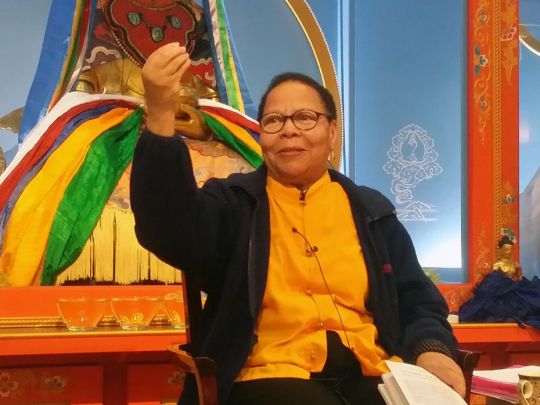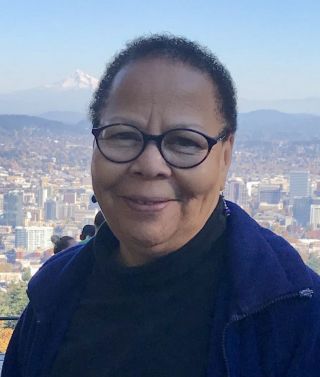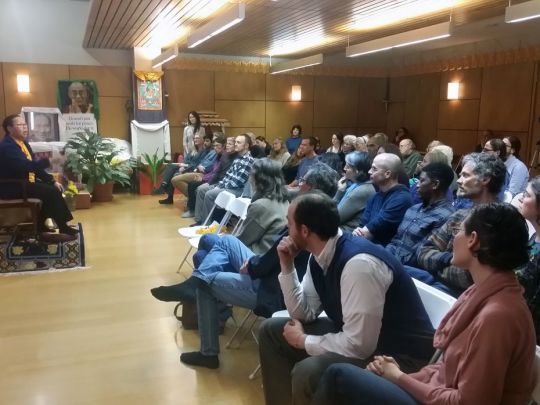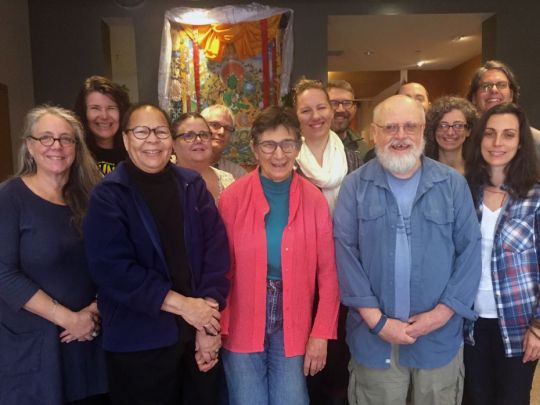- Home
- FPMT Homepage
Foundation for the Preservation of the Mahayana Tradition
The FPMT is an organization devoted to preserving and spreading Mahayana Buddhism worldwide by creating opportunities to listen, reflect, meditate, practice and actualize the unmistaken teachings of the Buddha and based on that experience spreading the Dharma to sentient beings. We provide integrated education through which people’s minds and hearts can be transformed into their highest potential for the benefit of others, inspired by an attitude of universal responsibility and service. We are committed to creating harmonious environments and helping all beings develop their full potential of infinite wisdom and compassion. Our organization is based on the Buddhist tradition of Lama Tsongkhapa of Tibet as taught to us by our founders Lama Thubten Yeshe and Lama Thubten Zopa Rinpoche.
- Willkommen
Die Stiftung zur Erhaltung der Mahayana Tradition (FPMT) ist eine Organisation, die sich weltweit für die Erhaltung und Verbreitung des Mahayana-Buddhismus einsetzt, indem sie Möglichkeiten schafft, den makellosen Lehren des Buddha zuzuhören, über sie zur reflektieren und zu meditieren und auf der Grundlage dieser Erfahrung das Dharma unter den Lebewesen zu verbreiten.
Wir bieten integrierte Schulungswege an, durch denen der Geist und das Herz der Menschen in ihr höchstes Potential verwandelt werden zum Wohl der anderen – inspiriert durch eine Haltung der universellen Verantwortung und dem Wunsch zu dienen. Wir haben uns verpflichtet, harmonische Umgebungen zu schaffen und allen Wesen zu helfen, ihr volles Potenzial unendlicher Weisheit und grenzenlosen Mitgefühls zu verwirklichen.
Unsere Organisation basiert auf der buddhistischen Tradition von Lama Tsongkhapa von Tibet, so wie sie uns von unseren Gründern Lama Thubten Yeshe und Lama Thubten Zopa Rinpoche gelehrt wird.
- Bienvenidos
La Fundación para la preservación de la tradición Mahayana (FPMT) es una organización que se dedica a preservar y difundir el budismo Mahayana en todo el mundo, creando oportunidades para escuchar, reflexionar, meditar, practicar y actualizar las enseñanzas inconfundibles de Buda y en base a esa experiencia difundir el Dharma a los seres.
Proporcionamos una educación integrada a través de la cual las mentes y los corazones de las personas se pueden transformar en su mayor potencial para el beneficio de los demás, inspirados por una actitud de responsabilidad y servicio universales. Estamos comprometidos a crear ambientes armoniosos y ayudar a todos los seres a desarrollar todo su potencial de infinita sabiduría y compasión.
Nuestra organización se basa en la tradición budista de Lama Tsongkhapa del Tíbet como nos lo enseñaron nuestros fundadores Lama Thubten Yeshe y Lama Zopa Rinpoche.
A continuación puede ver una lista de los centros y sus páginas web en su lengua preferida.
- Bienvenue
L’organisation de la FPMT a pour vocation la préservation et la diffusion du bouddhisme du mahayana dans le monde entier. Elle offre l’opportunité d’écouter, de réfléchir, de méditer, de pratiquer et de réaliser les enseignements excellents du Bouddha, pour ensuite transmettre le Dharma à tous les êtres. Nous proposons une formation intégrée grâce à laquelle le cœur et l’esprit de chacun peuvent accomplir leur potentiel le plus élevé pour le bien d’autrui, inspirés par le sens du service et une responsabilité universelle. Nous nous engageons à créer un environnement harmonieux et à aider tous les êtres à épanouir leur potentiel illimité de compassion et de sagesse. Notre organisation s’appuie sur la tradition guéloukpa de Lama Tsongkhapa du Tibet, telle qu’elle a été enseignée par nos fondateurs Lama Thoubtèn Yéshé et Lama Zopa Rinpoché.
Visitez le site de notre Editions Mahayana pour les traductions, conseils et nouvelles du Bureau international en français.
Voici une liste de centres et de leurs sites dans votre langue préférée
- Benvenuto
L’FPMT è un organizzazione il cui scopo è preservare e diffondere il Buddhismo Mahayana nel mondo, creando occasioni di ascolto, riflessione, meditazione e pratica dei perfetti insegnamenti del Buddha, al fine di attualizzare e diffondere il Dharma fra tutti gli esseri senzienti.
Offriamo un’educazione integrata, che può trasformare la mente e i cuori delle persone nel loro massimo potenziale, per il beneficio di tutti gli esseri, ispirati da un’attitudine di responsabilità universale e di servizio.
Il nostro obiettivo è quello di creare contesti armoniosi e aiutare tutti gli esseri a sviluppare in modo completo le proprie potenzialità di infinita saggezza e compassione.
La nostra organizzazione si basa sulla tradizione buddhista di Lama Tsongkhapa del Tibet, così come ci è stata insegnata dai nostri fondatori Lama Thubten Yeshe e Lama Zopa Rinpoche.
Di seguito potete trovare un elenco dei centri e dei loro siti nella lingua da voi prescelta.
- 欢迎 / 歡迎
简体中文
“护持大乘法脉基金会”( 英文简称:FPMT。全名:Foundation for the Preservation of the Mahayana Tradition) 是一个致力于护持和弘扬大乘佛法的国际佛教组织。我们提供听闻,思维,禅修,修行和实证佛陀无误教法的机会,以便让一切众生都能够享受佛法的指引和滋润。
我们全力创造和谐融洽的环境, 为人们提供解行并重的完整佛法教育,以便启发内在的环宇悲心及责任心,并开发内心所蕴藏的巨大潜能 — 无限的智慧与悲心 — 以便利益和服务一切有情。
FPMT的创办人是图腾耶喜喇嘛和喇嘛梭巴仁波切。我们所修习的是由两位上师所教导的,西藏喀巴大师的佛法传承。
繁體中文
護持大乘法脈基金會”( 英文簡稱:FPMT。全名:Found
ation for the Preservation of the Mahayana Tradition ) 是一個致力於護持和弘揚大乘佛法的國際佛教組織。我們提供聽聞, 思維,禪修,修行和實證佛陀無誤教法的機會,以便讓一切眾生都能 夠享受佛法的指引和滋潤。 我們全力創造和諧融洽的環境,
為人們提供解行並重的完整佛法教育,以便啟發內在的環宇悲心及責 任心,並開發內心所蘊藏的巨大潛能 — 無限的智慧與悲心 – – 以便利益和服務一切有情。 FPMT的創辦人是圖騰耶喜喇嘛和喇嘛梭巴仁波切。
我們所修習的是由兩位上師所教導的,西藏喀巴大師的佛法傳承。 察看道场信息:
- FPMT Homepage
- News/Media
-
- Study & Practice
-
-
- About FPMT Education Services
- Latest News
- Programs
- New to Buddhism?
- Buddhist Mind Science: Activating Your Potential
- Heart Advice for Death and Dying
- Discovering Buddhism
- Living in the Path
- Exploring Buddhism
- FPMT Basic Program
- FPMT Masters Program
- FPMT In-Depth Meditation Training
- Maitripa College
- Lotsawa Rinchen Zangpo Translator Program
- Universal Education for Compassion & Wisdom
- Online Learning Center
-
- Prayers & Practice Materials
- Overview of Prayers & Practices
- Full Catalogue of Prayers & Practice Materials
- Explore Popular Topics
- Benefiting Animals
- Chenrezig Resources
- Death & Dying Resources
- Lama Chopa (Guru Puja)
- Lama Zopa Rinpoche: Compendium of Precious Instructions
- Lama Zopa Rinpoche: Life Practice Advice
- Lama Zopa Rinpoche Practice Series
- Lamrim Resources
- Mantras
- Prayer Book Updates
- Purification Practices
- Sutras
- Thought Transformation (Lojong)
- Audio Materials
- Dharma Dates - Tibetan Calendar
- Translation Services
- Publishing Services
- Ways to Offer Support
- Prayers & Practice Materials
-
- Teachings and Advice
- Find Teachings and Advice
- Lama Zopa Rinpoche Advice Page
- Lama Zopa Rinpoche: Compendium of Precious Instructions
- Lama Zopa Rinpoche Video Teachings
- ༧སྐྱབས་རྗེ་བཟོད་པ་རིན་པོ་ཆེ་མཆོག་ནས་སྩལ་བའི་བཀའ་སློབ་བརྙན་འཕྲིན།
- Podcasts
- Lama Yeshe Wisdom Archive
- Buddhism FAQ
- Dharma for Young People
- Resources on Holy Objects
- Teachings and Advice
-
-
*If a menu item has a submenu clicking once will expand the menu clicking twice will open the page.
-
-
- Centers
-
- Teachers
-
- Projects
-
-
-
-
*If a menu item has a submenu clicking once will expand the menu clicking twice will open the page.
-
-
- FPMT
-
-
-
-
-
If you follow self-cherishing thoughts, those thoughts become your identity. Then anger, pride, the jealous mind – all this negative emotional stuff arises. When you let go of the I and cherish others, negative emotional thoughts do not arise. That’s very clear. Anger does not arise at those you cherish.
Share
Lama Zopa Rinpoche
-
-
-
- Shop
-
-
-
The Foundation Store is FPMT’s online shop and features a vast selection of Buddhist study and practice materials written or recommended by our lineage gurus. These items include homestudy programs, prayers and practices in PDF or eBook format, materials for children, and other resources to support practitioners.
Items displayed in the shop are made available for Dharma practice and educational purposes, and never for the purpose of profiting from their sale. Please read FPMT Foundation Store Policy Regarding Dharma Items for more information.
-
-
30

Dr. Jan Willis brings vigor into her teachings, Maitripa College, Portland, Oregon, US, October 2017. Photo courtesy of Leigh Miller.
Last Fall, Jan Willis, PhD, offered a three-week course, “Making the Invisible, Visible: The Other Side of ‘Perfect’: A Multi-media and Interactive Exploration of Race and Racism in the US,” as well as a public talk at Maitripa College in Portland, Oregon, US. Jan was an early student of Lama Yeshe and went on to become a well respected Buddhist studies scholar and teacher in the United States.
Namdrol Miranda Adams, Maitripa College Dean of Education and Community Service Instructor, shares key messages from the course taught at the Buddhist college. Namdrol’s story was originally published in the Winter 2017 issue of Northwest Dharma News:
Division by race continues to be an issue in the evolution of the Dharma in the West, leading a noted scholar and Dharma teacher to take on the subject for a course this recent autumn.
The course, at Maitripa College in Portland, was called: “Making the Invisible, Visible: The Other Side of ‘Perfect’: A Multi-media and Interactive Exploration of Race and Racism in the U.S.”

Dr. Jan Willis. Photo courtesy of Maitripa College.
It was led by Dr. Jan Willis, a noted Buddhist studies scholar, professor emerita of religion at Wesleyan University, and visiting professor at Agnes Scott College in Decatur, Georgia. Willis has been a student of Tibetan Buddhism for over forty years, and is a longtime friend to Maitripa.
The intention of the course was, in the safety and sanctity of a Buddhist environment, to explore the deep and troubling issues of race and racism in our country and in our lives. The course explored such questions as: “How does Buddhism help us to recognize our biases?” and “How does it provide meaningful solutions?”
Course objectives included giving students foundational knowledge in basic, relevant Buddhist terms and concepts such as dependent origination, the three wisdoms, bodhichitta, and equanimity. Also included was information on race theory and views, from major thinkers in the field.
The class included an introspective aspect, in which meditation and contemplative practices were introduced as tools for students’ own lives. These techniques for self-understanding helped them develop insight into their own and others’ identities and perceptions.
The class also dedicated time to discussion about issues of social inequality and its representation in popular media.
Course materials were drawn from a variety of sources, including contemporary film and documentary, rap and folk music, multimedia coverage of current events, comedy, historical research, and selected readings from memoirs and critical race theory.

Dr. Jan Willis giving a public talk at Maitripa College, Portland, OR, US, October 2017. Photo courtesy of Maitripa College.
Under the skillful guidance of Professor Willis, the class of seventeen students met three times a week for most of October, alternating lectures, discussion of the course materials, and conversation, with exercises and guided meditations for recognizing and working with bias. During the course the students deeply heard the stories and experiences of others.
A constant refrain in class was the mantra “get proximate,” which was an encouragement to remain present, and to open one’s mind and awareness to the situation and experience of race and bias in our lives and world.
The class was a glorious, poignant, and heart-wrenching journey into the relevant issue of the role of race, privilege, and bias in our culture, our communities, and our lives, today and in our recent past.
On the microscopic level it was an opportunity to look directly at our own particular roles in perpetuating the suffering of racism individually and as communities and cultures. On the macroscopic level it was an opportunity to see samsara in action and as it truly exists: a constructed reality based on and perpetuated by ignorance, and consistently nurtured by hatred, attachment, and fear.
The course was rooted in the context of the historical Buddha.
In his time the historical Buddha was famous for accepting into his community of spiritual practitioners students born into unfortunate circumstances and into low castes, as well as women. He was also famous for his teachings on loving kindness, compassion, and the essential perfection of every living being’s mind.
It is difficult to see how biased communities could grow out of a tradition that posits equanimity as the basis upon which many other spiritual qualities are cultivated; undiscriminating, egoless compassion as the perfect method by which to practice; and Buddha nature in every being as the core of potential for perfect Buddhahood.
However, it is a fact that the vast majority of Western (non-Asian) Buddhist communities in the United States are predominantly white and middle-class. It is also a fact that, for the most part, they are filled with well-educated, well-intentioned people who have no conscious wish to reproduce the broad injustices of American society (especially in terms of race and class) in their spiritual families.
And yet despite ourselves we see similar social stratifications occurring. What to do? How to deal?
The course experience was moving and transformative, and Dr. Willis displayed admirable courage and fortitude in guiding a group of eager and engaged students along a path of often-challenging self-inquiry and self-discovery, with a desire to act in service of positive change. The course ended with a gentle reminder of our own Buddha nature, and our inherent goodness.

Dr. Jan Willis and students on the last day of the course, Maitripa College, Portland, OR, US, October 2017. Photo courtesy of Maitripa College.
Here are some suggestions for immediate actions that Professor Willis left the class with:
- Listen to progressive radio (PBS, NPR, BBC)
- Visit African-American sections in bookstores
- Go to ethnically-inspired museums
- Volunteer at homeless shelters, food pantries, kitchens
- Create or contribute to an online public resource center webpage
- Become an ally by understanding the other
- Learn about and follow #BlackLivesMatter and #SayHerName
Maitripa College remains committed to its mission of offering contemplative learning founded upon three pillars of scholarship, meditation, and service. The school serves our students, and the region, through diverse and relevant educational, religious, and community programs such as these.
Maitripa College plans to continue this series in the coming years with courses that focus on other aspects of bias in society such as class and gender. These arise from ignorance and illustrate how we create and perpetuate samsara in our world, and why we must free ourselves from ignorance. Please watch our website www.maitripa.org for details about these upcoming programs.
FPMT.org and Mandala Publications brings you news of Lama Zopa Rinpoche and of activities, teachings, and events from over 160 FPMT centers, projects, and services around the globe. If you like what you read, consider becoming a Friend of FPMT, which supports our work.
- Tagged: jan willis, maitripa college, namdrol miranda adams
- Home
- News/Media
- Study & Practice
- About FPMT Education Services
- Latest News
- Programs
- New to Buddhism?
- Buddhist Mind Science: Activating Your Potential
- Heart Advice for Death and Dying
- Discovering Buddhism
- Living in the Path
- Exploring Buddhism
- FPMT Basic Program
- FPMT Masters Program
- FPMT In-Depth Meditation Training
- Maitripa College
- Lotsawa Rinchen Zangpo Translator Program
- Universal Education for Compassion & Wisdom
- Online Learning Center
- Prayers & Practice Materials
- Overview of Prayers & Practices
- Full Catalogue of Prayers & Practice Materials
- Explore Popular Topics
- Benefiting Animals
- Chenrezig Resources
- Death & Dying Resources
- Lama Chopa (Guru Puja)
- Lama Zopa Rinpoche: Compendium of Precious Instructions
- Lama Zopa Rinpoche: Life Practice Advice
- Lama Zopa Rinpoche Practice Series
- Lamrim Resources
- Mantras
- Prayer Book Updates
- Purification Practices
- Sutras
- Thought Transformation (Lojong)
- Audio Materials
- Dharma Dates – Tibetan Calendar
- Translation Services
- Publishing Services
- Teachings and Advice
- Find Teachings and Advice
- Lama Zopa Rinpoche Advice Page
- Lama Zopa Rinpoche: Compendium of Precious Instructions
- Lama Zopa Rinpoche Video Teachings
- ༧སྐྱབས་རྗེ་བཟོད་པ་རིན་པོ་ཆེ་མཆོག་ནས་སྩལ་བའི་བཀའ་སློབ་བརྙན་འཕྲིན།
- Podcasts
- Lama Yeshe Wisdom Archive
- Buddhism FAQ
- Dharma for Young People
- Resources on Holy Objects
- Ways to Offer Support
- Centers
- Affiliates Area
- Teachers
- Projects
- Charitable Projects
- Make a Donation
- Applying for Grants
- News about Projects
- Other Projects within FPMT
- Support International Office
- Projects Photo Galleries
- Give Where Most Needed
- FPMT
- Shop
Subscribe to FPMT News
Translate*
*powered by Google TranslateTranslation of pages on fpmt.org is performed by Google Translate, a third party service which FPMT has no control over. The service provides automated computer translations that are only an approximation of the websites' original content. The translations should not be considered exact and only used as a rough guide.We often feel miserable and our world seems upside-down because we believe that external things will work out exactly as we plan and expect them to.








